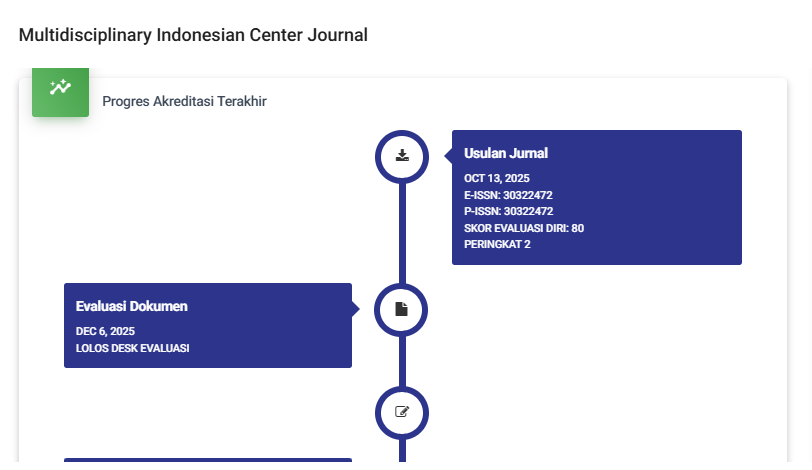THE CORRELATION BETWEEN PRINCIPALS’ TRANSFORMATIONAL LEADERSHIP, WORK CLIMATE, AND TEACHERS’ SKILL VARIETY AND TEACHERS’ TEAM EFFECTIVENESS IN INTEGRATED ISLAMIC JUNIOR HIGH SCHOOLS IN RIAU ISLANDS PROVINCE
DOI:
https://doi.org/10.62567/micjo.v2i3.1376Keywords:
Transformational Leadership, Work Climate, Skill Variety, Teacher Work Team EffectivenesAbstract
This study aims to analyze the influence of Transformational Leadership, Work Climate, and Skill Variety on the effectiveness of teacher work teams at Integrated Islamic Junior High Schools in the Riau Islands Province. The research uses a quantitative approach with a survey method. The sample consists of 120 teachers selected through proportional stratified random sampling. The research instrument is a Likert-scale questionnaire that has been tested for validity and reliability. Data analysis was carried out using Spearman correlation tests and non-parametric regression with the aid of SPSS version 29.00. The results show that all independent variables are positively and significantly related to teacher work team effectiveness (Transformational Leadership: ρ = 0.757; Work Climate: ρ = 0.795; Skill Variety: ρ = 0.767; p < 0.05). Non-parametric regression testing indicates a significant simultaneous effect (ρ = 0.000). Partially, Transformational Leadership (p = 0.253; p = 0.000), Work Climate (ρ = 0.355; p = 0.000), and Skill Variety (ρ = 0.282; p = 0.000) significantly influence teacher work team effectiveness. Work climate is proven to be the dominant factor affecting team effectiveness. The implications of this study affirm that improving teacher work team effectiveness must be carried out holistically through strengthening school principals’ transformational leadership, creating a conducive work climate, and developing teachers’ skill variety.
Downloads
References
Asrulla, Asrulla, Kasful Anwar, and M. Y. Mahmud. "Membangun Competitive Advantage Sekolah Dalam Menghadapi Tantangan Globalisasi Pendidikan."Jurnal Genta Mulia15, no. 2 (2024): 1-10.
Asrulla, Asrulla, Tuti Indriyani, and Firdaus Jeka. "Tantangan Manajemen Sumber Daya Manusia Dalam Pendidikan Era Society 5.0 ."Jurnal Genta Mulia15, no. 1 (2024): 161-178.
Asrulla, Asrulla. "Pengaruh Pelatihan, Pengalaman Kerja, dan Reward terhadap Kinerja Tenaga Pendidik Pada Direktorat Pendidikan Nurul Islam Group Batam."Indonesian Journal of Islamic Educational Management5, no. 1 (2022): 35-45.
Asrulla, Asrulla, Risnita Risnita, M. SyahranJailani, and Firdaus Jeka. "Populasi dan sampling (kuantitatif), serta pemilihan informan kunci (kualitatif) dalam pendekatan praktis."Jurnal Pendidikan Tambusai7, no. 3 (2023): 26320-26332.
Avolio, B. J., & Bass, B. M. (2002). Developing potential across a full range of leadership: Cases on transactional and transformational leadership. Mahwah, NJ: Lawrence Erlbaum Associates.
Bass, B. M. (1990). From transactional to transformational leadership: Learning to share the vision. Organizational Dynamics, 18(3), 19–31. https://doi.org/10.1016/0090-2616(90)90061-S
Hackman, J. R. (1987). The design of work teams. In J. W. Lorsch (Ed.), Handbook of organizational behavior (pp. 315–342). Englewood Cliffs, NJ: Prentice Hall.
Hackman, J. R., & Oldham, G. R. (1980). Work redesign. Reading, MA: Addison-Wesley.
Harahap, R. (2020). Kepemimpinan, iklim organisasi, dan kompetensi guru terhadap efektivitas tim sekolah. Jurnal Administrasi Pendidikan, 28(3), 201–214
Hoy, W. K., & Miskel, C. G. (2013). Educational administration: Theory, research, and practice (9th ed.). New York, NY: McGraw-Hill.
Humphrey, S. E., Nahrgang, J. D., & Morgeson, F. P. (2007). Integrating motivational, social, and contextual work design features: A meta-analytic summary and theoretical extension of the work design literature. Journal of Applied Psychology, 92(5), 1332–1356. https://doi.org/10.1037/0021-9010.92.5.1332
Jeka, Firdaus, and Tuti Indriyani. "Penerapan Fungsi-Fungsi Manajemen dalam Pengembangan Lembaga Pendidikan Islam."Jurnal Genta Mulia15, no. 1 (2024): 189-197
Jeka, Firdaus, and Roni Junaidi. "membangun organisasi sekolah yang lebih adaptif di era digitalitasi pendidikan." educational journal of the emerging world (ejew) 3, no. 1 (2024): 10-22.
Judge, T. A., & Piccolo, R. F. (2004). Transformational and transactional leadership: A meta-analytic test of their relative validity. Journal of Applied Psychology, 89(5), 755–768. https://doi.org/10.1037/0021-9010.89.5.755
Koys, D. J., & DeCotiis, T. A. (1991). Inductive measures of psychological climate. Human Relations, 44(3), 265–285. https://doi.org/10.1177/001872679104400304
Kozlowski, S. W. J., & Ilgen, D. R. (2006). Enhancing the effectiveness of work groups and teams. Psychological Science in the Public Interest, 7(3), 77–124. https://doi.org/10.1111/j.1529-1006.2006.00030.x
Litwin, G. H., & Stringer, R. A. (1968). Motivation and organizational climate. Boston, MA: Harvard University Press.
Mulkeen, A., Chapman, D. W., DeJaeghere, J. G., & Leu, E. (2017). Recruiting, retaining, and retraining secondary school teachers and principals in Sub-Saharan Africa. World Bank Working Paper. Washington, DC: The World Bank.
Nurhayati. (2020). Pengaruh iklim kerja dan motivasi terhadap efektivitas tim guru di sekolah swasta. Jurnal Administrasi Pendidikan, 27(2), 145–156.
Ramadhani, S. (2021). Skill variety dan pengaruhnya terhadap efektivitas kerja tim guru. Jurnal Manajemen Pendidikan, 9(1), 55–67.
Suyanto. (2019). Kepemimpinan transformasional kepala sekolah dan efektivitas kerja guru. Jurnal Ilmu Pendidikan, 25(1), 23–34.
Downloads
Published
How to Cite
Issue
Section
License
Copyright (c) 2025 Suntama Putra, Risnita, Kemas Imron Rosadi, Asrulla

This work is licensed under a Creative Commons Attribution-ShareAlike 4.0 International License.



























